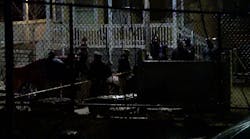In what may be one of the most gratifying news stories of 2015, the site administrator of Colorado Cop Block has plead guilty to federal charges of Interstate Communications with the Intent to Extort (18 U.S.C. Section 875c) after being arrested in January for posting a series of comments on the Colorado Cop Block Facebook page that clearly exceeded the bounds of free speech.
According to the complaint against him, on January 13th McCaskill posted, “I’ll kill an FBI agent or foot soldier if they come at me… now come arrest me you (expletive) cowards… I’m going to be a pig’s worst nightmare. Come get me”
Two days earlier, he had made threats on the Colorado Cop Block page directed at an Oklahoma police officer, writing, “If someone was to gun this Oklahoma officer down, I will be the first to donate to his defense fund.”
Then, on January 15th, McCaskill reportedly posted, “I’m going to kill an officer or two and let them take me out. What the (expletive) are they going to do? Die with me. We can just have some suffering families.” He was later taken into custody by FBI agents at The Riviera Hotel and Casino in Las Vegas… apparently without incident, as he completely forgot to be their worst nightmare when they graciously honored his request to “come get me.”
McCaskill faces up to five years in prison, possible fines of up to $250,000, or both. If incarcerated he will not be eligible for early release or parole. - From NBC affiliate KTEN & www.copblock-exposed.org
Cop Block claims to be, by its own definition, “…a grassroots organization working to make police accountable for their actions. The organization's members and volunteers attempt to draw attention to alleged or evident police abuses that happen across the United States, and work to film police to force transparency and accountability within their ranks.”
Fine, but to anyone who has seen their postings and work, their antipathy and that of their followers toward law enforcement – any law enforcement – is crystal clear. The reality is, Cop Block was founded by two anarchists and voluntaryists, ideas antithetical to support or acceptance of state authority. To Cop Block and its fans, there are no good cops: all law enforcement is equally culpable for any bad acts perpetrated by any officer anywhere; listening to, or seeking to understand, explanations of legitimate law enforcement actions is anathema; acknowledging proper policing in any way is unheard of, and public behavior of good cops is cynically dismissed. At least, that is my experience with the organization and its supporters.
That Cop Block is so unfailingly and aggressively anti-police is one of the reasons McCaskill’s conviction is so satisfying. That he took being anti-police to an extreme and dangerous level even more so. Cop Block has been a source of cops’ “excess stomach acid production” for a long time, and a glaring example of what has come to feel like constant criticism from the biased and uninformed. It is, however, just one of many such organizations and movements either founded on a premise of radical anti-police sentiment or characterized by fringe elements within holding such views. It is no wonder police officers feel increasingly besieged.
When Cop Block, the Black Lives Matter movement, Occupy _________, the New Black Panthers, sovereign citizen, and other such groups either center on an anti-police platform, or feature affiliated subgroups who do even if the larger movement may not, two distinct dangers for police arise. One danger is psychological, the other physical, and to overcome both requires the ability to consider and act on two seemingly (but not really) contradictory ideas.
First, seeing and hearing the vitriol directed toward them increases the likelihood of officers focusing too much on the hatred of individuals and groups who really are on the philosophical fringe, and leads them to feel both embattled and embittered. Media focus on our most outspoken, most venomous, and most visible critics and protesters ignores the fact their views do not represent those of most people in the community, even the communities from which they mostly come, and legions of silent supporters still exist across all social and demographic strata. Faced with the shrill rage of the minority who hate law enforcement on principle, insisting we are “all the same” when one of us does do wrong despite ample evidence otherwise, too many officers internalize distrust and contempt for all. This is a lonely and sad place to be, fostering cynicism, anger, and depression within the officers who cannot or will not distinguish between those on the fringe and all the rest.
The second idea is that, despite almost all the true hatred for police and authority being a product of fringe players, such outlying philosophies can still gain dangerous and unprecedented traction in today’s media and technological climate. In an era of unprecedented journalistic content and variety and social media’s power to reach mass numbers of people and influence behavior, is it any wonder even the objectively unhinged but charismatic can galvanize followers into a movement, even if unintentionally? Does it surprise any of us that movements grow and morph, sometimes quickly and far beyond their original intent, and some may be inspired to violence by leaders and “heroes” they’ve never met and would have never even heard of a decade ago? And is anyone really shocked when certain people, apparently driven by hate and emboldened by fiery rhetoric, lash out violently against us?
The dichotomy – and one we must master to remain both physically safe and emotionally sane – is that the animosity facing law enforcement today is mostly a product of a fringe that does not represent any widespread, conventional thought but still poses a serious and disproportionate threat. The challenge for law enforcement is to remain engaged – or perhaps reengage – with the public they serve in ways both meaningful and mutually supportive while addressing the increasing threat to officers from a very small but motivated minority set on undermining and sometimes harming them, without compromising constitutional adherence and best practices of community policing. The task for individual officers is to prepare for the increased threat from fringe players without isolating from, or alienating, the vast majority of people who are mostly on our side. Demonstrating empathy and professionalism toward all, including those who hate us the most, can be the most disarming and effective response. We’re all under the microscopes of a lot of people and organizations just waiting to see us screw up, ensuring we don’t needs to be a 24/7 job.
Avoiding the urge to generalize the mindset of the fringe to that of the general public, recommitting to ever-greater professionalism to erase doubts about us when critics rightfully expose high-profile failings in that area, finding new ways to engage citizens positively to build bridges, and letting go of feeling “embattled and embittered” is a good start.


